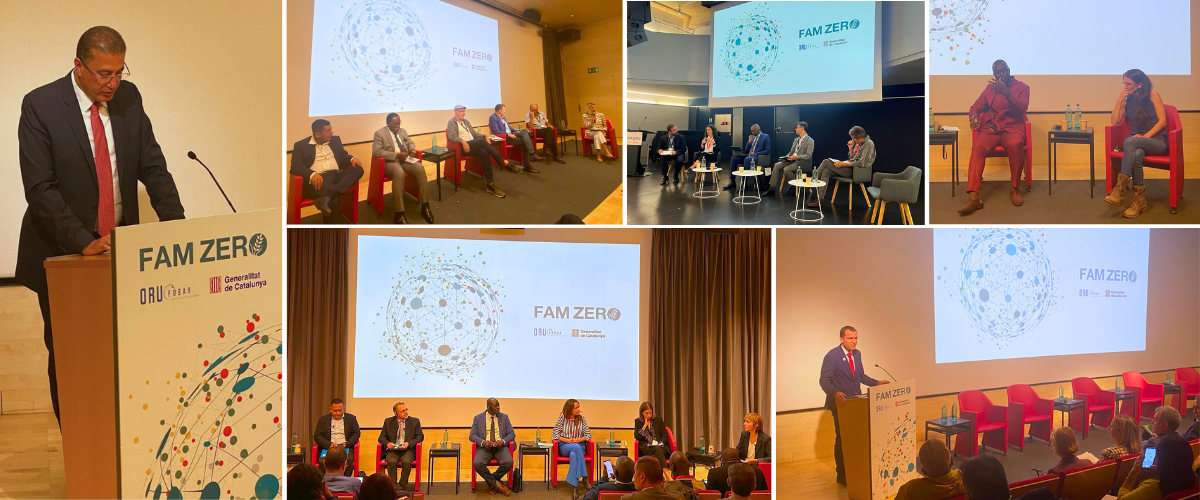The V Summit was a clamor in favor of proximity food

If the IV Summit of Zero Hunger Regions, held in 2022 in Temuco, Araucanía, Chile, was the moment when regionalism made a definitive commitment to food sovereignty, going beyond the concept of food security, the V Summit was a unanimous commitment in favor of local food. The “Manifesto Catalunya” solemnly expressed it when it stated: “Food sovereignty requires a firm commitment to proximity”.
During the Summit, Carlo Petrini and the Slow Food movement were quoted. With this reference, it is normal that the manifesto said: "It is essential to support local production strategies and also to protect the guarantees of origin, through the protected designation of origin seals, as well as to promote short marketing circuits that bring producers and consumers closer together, facilitating efficient market systems, traceability throughout the food chain. In this way, local economies are strengthened, and access to fresh, quality food is guaranteed”.
Already at the opening of the Summit, both the host, the Regional Minister of Agriculture, Livestock, Fisheries and Food of Catalonia, Òscar Ordeig, and the President of ORU Fogar, Rachid el Abdi, focused their speeches on the issue of proximity. The Minister pointed out the importance of guaranteeing the availability of food and doing it responsibly and under sustainability criteria. He undertook to promote the Food Chain Act and to ensure that at least 50% of the food purchased by the public administration is of local origin.
The origin of food
Rachid el Abdi rejected a food system that "depends on massive imports, with sometimes dizzying distances between producers and consumers. This model is not only unstable, it is also unsustainable". In the inaugural lecture, Corinna Hawkes, director of Food Systems at FAO, expressed herself in a similar vein: “Our agrifood system is not broken, but it is worn out, exhausted and sick, because we are asking it to do too much, without taking care of it or investing enough in it”.
Antoni Massanés, from the Alicia Foundation, made a special reference to the need for proximity. “We are not going to deny,” he explained, “ international food trade. In Europe we want to eat chocolate, but we must know where the cacao comes from”. He rejected, however, the global food uniformity towards which there is a tendency. "We can't all eat the same thing all over the world. We must eat different things. Because, if we all eat the same varieties, in the end, it is a serious danger for biodiversity". In conclusion, the importance of knowing the origin of one's food is emphasized.
From Hungary to Korea
Proximity was called for from very different geographies. Gyula Ocskay, secretary general of the Central European Service for Cross-Border Initiatives (CESCI) explained the difficulty of buying local products when there is a border, even within Europe. Within the European Union - he explained - the Member States have the competence to define the rules on the production and retailing of local products. As a result, local products produced on the other side of the border cannot be purchased. The development of short cross-border supply chains is ultimately impossible. The CESCI secretary general explained, in any case, how a cross-border network of Slovak-Hungarian local products has developed and the legal obstacles it has had to overcome.
The director general of the Gyeonggi Bureau of Agriculture, Fisheries and Life Sciences, Jeong Sik Kong, presented the plans of this Korean province, which represent a radical commitment to local production. He explained that the entire public sector, from schools, military centers, kindergartens, and women's centers to the provision of food to vulnerable groups, is 100% supplied by local agriculture. On the private side, the provincial government supports local stores and markets to support direct sales of local agricultural products. "We support direct trade between local producers and consumers, thus reducing intermediate distribution processes, facilitating transportation and logistics. With these policies, we provide safe and fresh food to our population, revitalize our economy and, in addition, reduce the emissions associated with transportation and distribution".
Against salmon
Those who also made a radical defense of proximity were the chefs Charli Koffi from Ivory Coast and the Catalan Maria Nicolau, in a conversation that was one of the most interesting moments of the entire Summit. The Ivorian, a person who is destined to be the African Gaston Acurio, explained that in his restaurant in Abidjan, he practices maximum proximity, since the products go from his garden to the pot and, from there, to the customer's plate. At a certain point, the Catalan made reference to the fact that, in Catalonia, the consumption of salmon was being imposed, an absolutely strange fish in a Mediterranean diet, while the varieties of fish caught every day by the Catalan fishing fleets were being disregarded. Koffi added to the rejection when he explained that to feed these salmon, fishmeal was being produced, ravaging African fishing grounds, to the despair of artisanal fishermen in Senegal, Gambia, Guinea, or Côte d'Ivoire.










































































